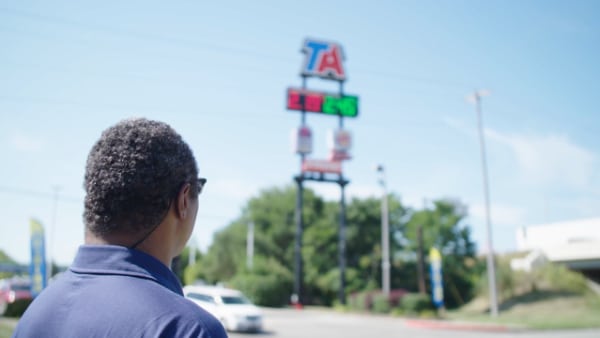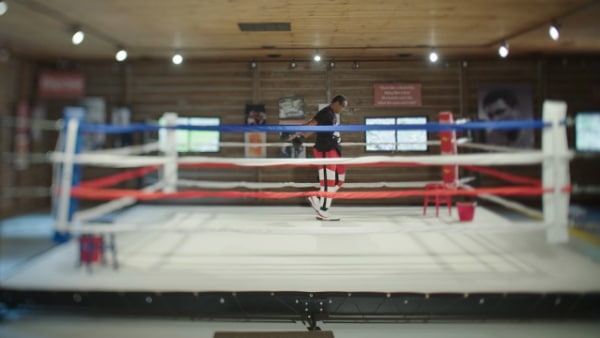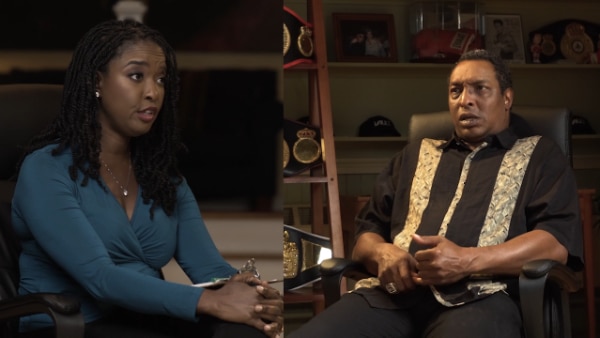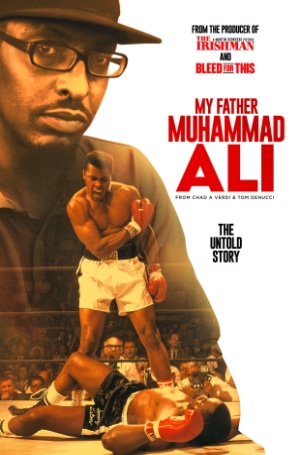One would suspect that a film entitled, My Father Muhammad Ali, would be about Muhammad Ali from his child’s perspective. But it’s not. It’s actually about Muhammad Ali Junior, youngest child and only son of the boxing legend (with his second wife), and the struggles of his life – struggles that most people will be able to connect with in one way or another. It also offers a ray of hope to those struggling with mental health issues and addiction.
My Father Muhammad Ali opens in theaters on January 13th.
In the documentary film, Muhammad Ali Jr opens up about his upbringing. The picture he paints of his famous father’s fatherhood is anything but favorable. Abandoned by Ali Sr when he was five, Ali Jr was raised by his maternal grandparents. As he grew up in poverty, he experienced bullying and other issues of childhood neglect, leading to a crack addiction and use of prostitutes as an adult.
He tells about a turning point in his life when he was 14 years old. Spending time with his dad, they stopped at a gas station. Young Muhammad went into the store to get something to eat. When he got back outside his dad was gone. After calling Ali Senior’s new wife to tell her what happened, he was finally picked up by his dad who had forgotten that he had been in the car. The Parkinson’s disease that Ali Sr suffered from was beginning to manifest itself.

As far as family matters go, it seems like the apple didn’t fall far from the tree. The boxer nicknamed “The Greatest” had four wives and numerous affairs. Ali Jr’s own marriage failed, and he had become estranged from his two daughters. It seems like the making of this film was one way he was trying to reconnect with his daughter, Saliah.
He’s been clean and sober for a couple of years now and is actively working to turn his life around. He’s studying for his GED. He’s also turned his dad’s training camp in Deer Lake, Pennsylvania into The Muhammad Ali Legacy Continues, including “Fighter’s Heaven,” a camp that promotes anti-bullying for youngsters by teaching them how to fight, developing their self-confidence and sense of empowerment.

There is, however, a very strange element to Ali Jr’s Hollywood testimonial. Throughout the film are interviews between Ali Jr and Doctor Monica O’Neal, a Harvard-trained psychologist, who has consulted for various media outlets, including being a camp counselor on Bravo TV’s “Camp Getaway.” This makes the viewing of My Father Muhammad Ali uncomfortably feel like one is sitting in on someone else’s therapy session. Only at the very end of the credits is there a disclaimer that says Ali Jr has never been a patient of Dr. O’Neal.

One might wonder why Muhammad Ali Junior deserves this tell-all film. Maybe he does and maybe he doesn’t. That’s up to each viewer to decide. After all, the difficulties he’s faced in life are also experiences of countless others. Why not keep his journey between himself and his therapist? What makes him so special? Nothing, really, except his famous daddy and a recognizable last name.
If nothing else, though, making My Father Muhammad Ali must have provided a healing venue for Ali Jr as he related his own story. That story just might provide a sense of hope for others who are experiencing dark times, no matter what they are. When one is suffering, it helps to know that one is not alone. Others, like Muhammad Ali Junior, have walked the path and have come out on the other side to healing and hope.



